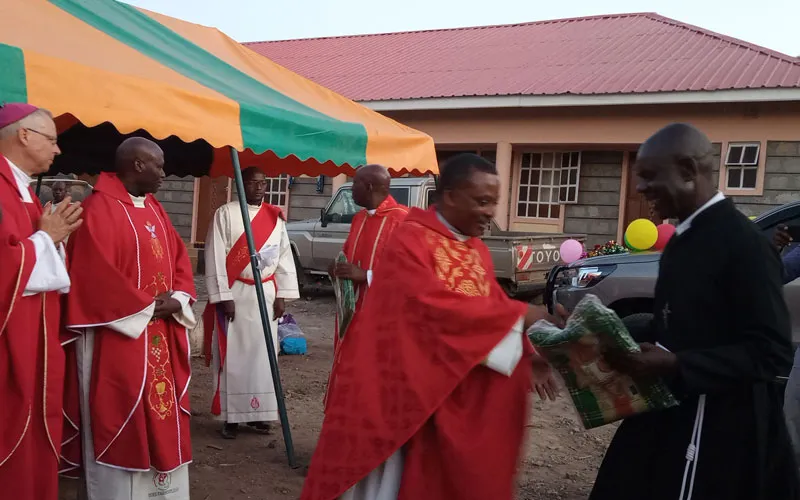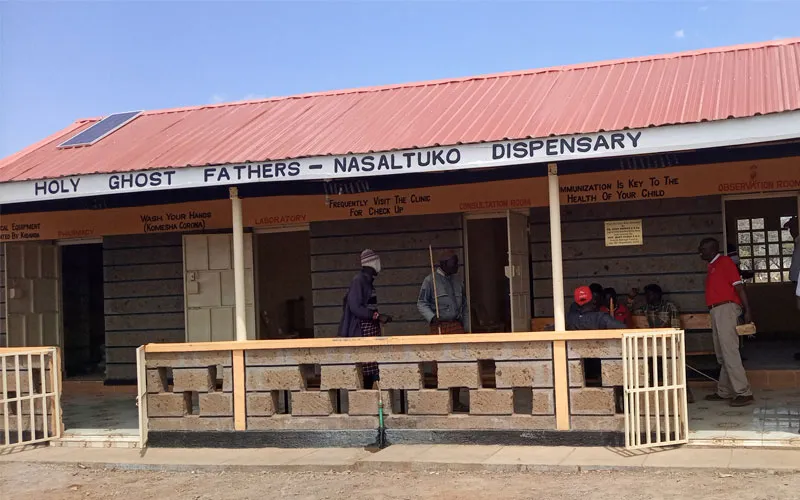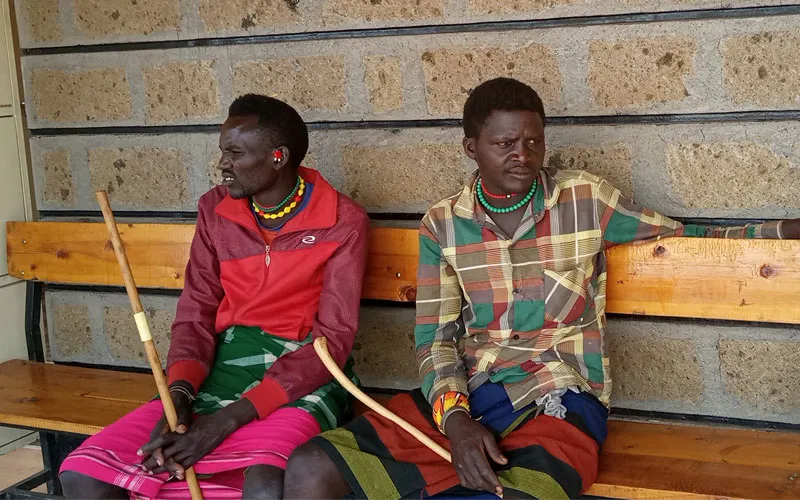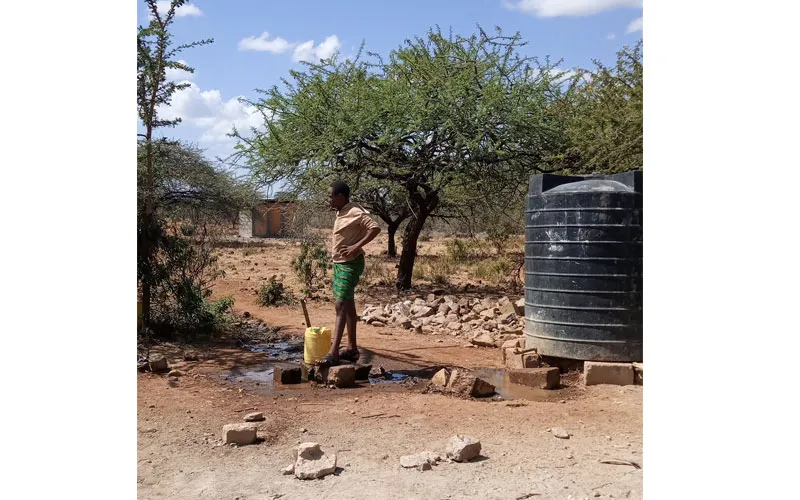Owing to the lack of clean water, the Pokot who walk as far as 50 kilometers in search of the valuable commodity also suffer from diarrhea and other poor hygiene complications. The extreme heat is responsible for the skin infections they come with at the clinic.
Recently, Br. Sebastian and his team led by Fr. Maxwell Atugba who is the Priest in charge of St. Luke, Tangulbei mission, established a Nasaltuko Dispensary, about 20 kilometers from the mission headquarters to improve accessibility to the mission health services.

Located in a valley that is surrounded by Kaako, Koroloi, Butoro and Kamel mountains, Nasaltuko Dispensary has relieved Jacob Lotiboi, a resident of Kaako village, the burden of walking for miles in search of medication.
“Just the other day, I was walking down the mountain and I found a woman who was bleeding out after she was stabbed by bandits. Thankfully, the dispensary was near and when I carried her there, she was treated quickly and discharged,” Mr. Lotiboi tells ACI Africa.
(Story continues below)
The 61-year-old father of 20 says the dispensary is a blessing to residents of all the four villages surrounding it.

“Before the dispensary was constructed, our women and children walked for over 50 kilometers in search of government hospitals. Sometimes we walked for over 20 kilometers to the mission centre run by the Fathers where we are treated. Today, the doctors have come close to us and we are really thankful,” he says.
All the achievements notwithstanding, the mission health facility is grappling with a variety of challenges, key among them retrogressive culture where some residents are yet to fully trust hospitals.
Language barrier is also an issue for the hospital staff who find it difficult communicating with patients who can only express themselves in their local language.

Additionally, some patients have their misconstrued ideas of medication, Br. Sebastian says, adding that such patients find it difficult to believe what their medical doctors tell them.
“We have patients who only believe in injections. When we prescribe other medications such as tablets or inhalers, they turn them down and go to other hospitals,” the native of Kenya’s Kakamega Diocese says.
But the biggest challenge, Br. Sebastian says, is maternity, noting that delays in attending to pregnant mothers is resulting in many preventable maternal deaths.
“People here are so used to home deliveries that they sometimes come to us when it is too late. But they are not entirely to blame since many of them stay in interior parts of this region where there are limited means of transport,” the Religious Brother says.

Among the best qualities that Br. Sebastian has learnt about the Pokot, is how they value life.
“The Pokot do everything in their power to take care of a sick person. But they have no business with the dead person. This is unlike people in other communities who abandon their sick and needy but only spend a lot of money when the person dies,” he says.
The health facility is just one in a variety of activities that the Spiritans, also known as the Holy Ghost Fathers, who have been ministering in Tangulbei since 1990 oversee.
The Priests have beaten all odds including harsh climate, rough terrain and sometimes, hostility from residents to work towards alleviating poverty and illiteracy in one of the most marginalized regions in Kenya.
The Spiritans also run St. Luke’s Primary School, one of the best schools in East Pokot which offers boarding and day facilities to some 220 learners. There are some 51 girls and 21 boys who share one boarding facility at the school that does not have a boys’ dormitory.

Started in 2006 with pupils who attended classes under a tree in an open field, the school now has 12 qualified staff and five members of the subordinate staff and still admits vulnerable children who are sponsored by the Spiritans, the Catholic Diocese of Nakuru as well as individual well-wishers.
Fr. Maxwell notes that the biggest challenge is keeping the learners in school, especially female students, saying, “We always admit more girls than boys in junior classes. However, not many girls complete school as many are married off.”
The Spiritans also oversee a nursery school whose enrollment has grown from 45 in 2016 when Fr. Maxwell took up the leadership of the mission to the current 82.
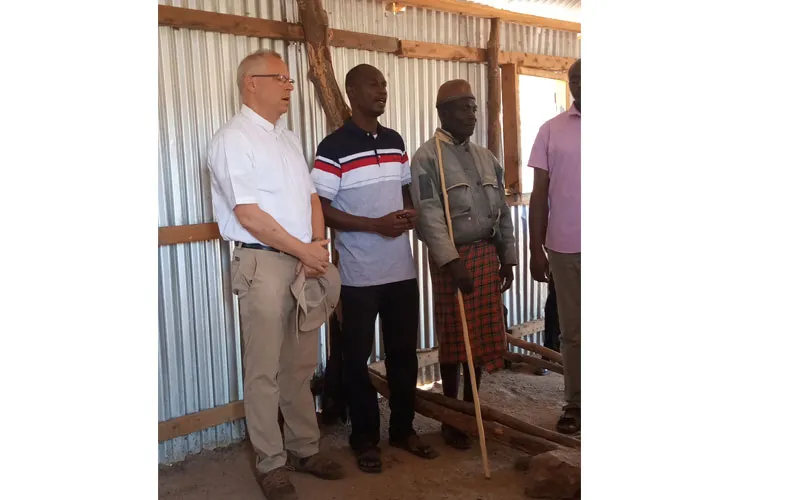
Additionally, the number of Christians participating actively in the Church and those receiving Holy Communion has increased in an area where the Spiritans are carrying out primary evangelization.
At the close of the Spiritans’ second Provincial Chapter Friday, January 15, the outgoing Spiritan Provincial Superior for Kenya and South Sudan, Fr. John Mbinda affirmed that Tangulbei residents are friendly people who are yearning for evangelization.
“Despite their challenges, the Pokot are very good people who want to move on in terms of development just like the other peoples of this country. They want to know about the loving God. They can be instructed in faith. It is just us who have not been there for them,” said Fr. Mbinda.

Recounting his experience at the helm of the Spiritan Congregation in Kenya and South Sudan, Fr. Mbinda said Tangulbei was inaccessible when he toured the mission years ago.
“There were no roads to reach our people. Many times, I had to make a road between thickets when I wanted to visit a Christian,” the Kenyan-born Cleric said, adding that the mission cars were worn out fast owing to the rocky ground that characterizes the Tangulbei terrain.
The outgoing leadership of the Spiritans in Kenya and South Sudan handed the incoming Provincial Superior, Fr Dominic Gathurithu, a brand-new Toyota Hilux to equip him for the mission ahead.

Other activities that marked the closure of the Spiritans’ Chapter meeting included a funds drive for the construction of a theatre facility at the clinic and the commissioning of the Blessed Daniel Brottier Conference Hall and Accommodation facility at the mission centre.
The facility, Fr. Maxwell explained, would provide reliable accommodation to people who come from far to work in Tangulbei.
“After the launch, we expect all our staff to stay and not run away because of inadequate accommodation facilities. For our clinic staff, we expect their around-the-clock presence and response to the patients whenever they are needed,” said Fr. Maxwell.
Agnes Aineah is a Kenyan journalist with a background in digital and newspaper reporting. She holds a Master of Arts in Digital Journalism from the Aga Khan University, Graduate School of Media and Communications and a Bachelor's Degree in Linguistics, Media and Communications from Kenya's Moi University. Agnes currently serves as a journalist for ACI Africa.
